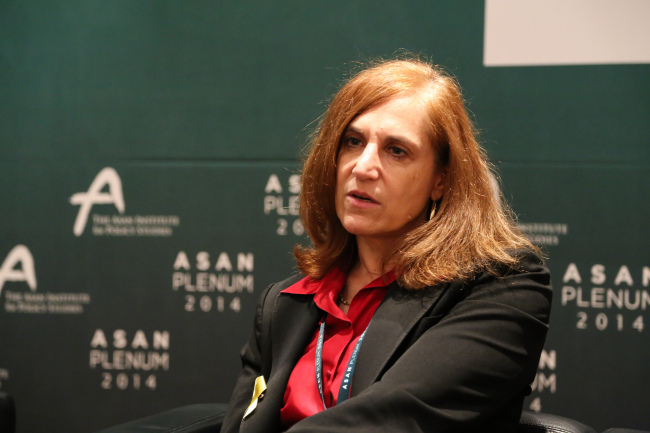[Herald Interview] ‘For Xi, summit with N. Korean leader may be diplomatic card’
By Korea HeraldPublished : April 28, 2014 - 21:12
Chinese leader Xi Jinping may be using the possibility of a summit with North Korean leader Kim Jong-un as a diplomatic card to pressure the isolated, impoverished neighbor to behave, a U.S. scholar said.
In a recent interview with The Korea Herald, Bonnie Glaser, senior advisor for Asia at the Center for Strategic and International Studies, also noted that despite Pyongyang’s aberrant behavior, Beijing would continue to prioritize maintaining stability in the North.
“I think Xi Jinping recognizes that this (a summit with Kim) is a card that he can play because I think this is something that Kim does want. So, it is a lever that China can use,” she said during the interview on the sidelines of the Asan Plenum forum hosted by the Asan Institute for Policy Studies in Seoul.
Glaser pointed out that the Chinese leader has “quite deliberately” shunned talks with Kim, while he has already met South Korean President Park Geun-hye four times and is expected to meet her again later this year.
In a recent interview with The Korea Herald, Bonnie Glaser, senior advisor for Asia at the Center for Strategic and International Studies, also noted that despite Pyongyang’s aberrant behavior, Beijing would continue to prioritize maintaining stability in the North.
“I think Xi Jinping recognizes that this (a summit with Kim) is a card that he can play because I think this is something that Kim does want. So, it is a lever that China can use,” she said during the interview on the sidelines of the Asan Plenum forum hosted by the Asan Institute for Policy Studies in Seoul.
Glaser pointed out that the Chinese leader has “quite deliberately” shunned talks with Kim, while he has already met South Korean President Park Geun-hye four times and is expected to meet her again later this year.

“I think this has probably angered Kim Jong-un because he had to witness Xi Jinping meeting with President Park and I think it was quite objectionable to Kim and was a real slap in the face,” said Glaser.
Speaking of China’s approach toward its recalcitrant neighbor, the scholar said there has been an “evolution” of China’s assessment of the North and its strategic values regarding China, but Beijing would refrain from taking any actions that might destabilize the North.
“The risks have gone up. They see North Korea as unpredictable, and they are very much opposed to nuclear weapons program. But that doesn’t really translate into a fundamental change in China’s interests in North Korea,” she said.
“China still has a very deep interest in the preservation of stability in North Korea, and they will only pursue denuclearization on the premise of maintaining stability. So there is no consideration of using any tools or methods that might destabilize North Korea.”
Although Pyongyang’s denuclearization may not be the first and foremost issue for Beijing, the emerging power is serious about negative ramifications associated with the North’s nuclear program, Glaser stressed.
“Development of nuclear weapons by North Korea, at the end of the day, is likely to lead to other problems that would deeply affect Chinese interests. If it really has a deterrent, which today it does not, Japan, at some point, would decide to go nuclear,” she said.
“We could end up with the proliferation of materials, weapons, technology or know-how, scientists for example to other countries. We have already seen proliferation to Syria.
Touching on the difficulty in fostering security cooperation among South Korea, the U.S. and Japan, Glaser said that another North Korean provocation could serve as a stark reminder of the importance of trilateral collaboration.
“My guess is that we will see another North Korean action sometime within the coming weeks, if not months ― whether it would be a long-range missile test or nuclear test. I think that would be a reminder to Japan, Korea and the U.S. of how important this trilateral security cooperation is,” she said.
“Unfortunately, North Korea has been the beneficiary, I think, of some of the diminished cooperation or tensions that we have been seeing, and the slowing of this trilateral cooperation if you will.”
As to Japanese Prime Minister Shinzo Abe’s nationalist moves, including his visit to the controversial Yasukuni Shrine, Glaser noted that they have triggered anxiety within the U.S. as well.
Citing recent remarks by Joseph Nye of Harvard University, she said that although the hawkish Japanese leader has taken a variety of security and economic policy steps that would help enhance U.S. interests, he was trying to sell them in an “objectionable” way.
Those steps included Tokyo’s creation of the national security council, the resolution of the relocation of a U.S. military base, the increase in Japan’s defense spending and a decision to join the Trans-Pacific Partnership, a U.S.-led deal to create a free-trade bloc linking Pacific-rim states.
The steps, coupled with Tokyo’s unapologetic attitude, have unnerved South Korea and China, major victims of Japan’s past militarism.
“As Nye said, he has wrapped all these things in the 1930s newspaper. So he’s trying to sell them in a way that is objectionable, I think to many people including many Americans,” she said. “So, we hope he would take off this 1930s newspaper and find a different way to present it to the world.”
By Song Sang-ho (sshluck@heraldcorp.com)
-
Articles by Korea Herald







![[Graphic News] More Koreans say they plan long-distance trips this year](http://res.heraldm.com/phpwas/restmb_idxmake.php?idx=644&simg=/content/image/2024/04/17/20240417050828_0.gif&u=)
![[KH Explains] Hyundai's full hybrid edge to pay off amid slow transition to pure EVs](http://res.heraldm.com/phpwas/restmb_idxmake.php?idx=644&simg=/content/image/2024/04/18/20240418050645_0.jpg&u=20240419100350)






![[From the Scene] Monks, Buddhists hail return of remains of Buddhas](http://res.heraldm.com/phpwas/restmb_idxmake.php?idx=652&simg=/content/image/2024/04/19/20240419050617_0.jpg&u=20240419175937)

![[KH Explains] Hyundai's full hybrid edge to pay off amid slow transition to pure EVs](http://res.heraldm.com/phpwas/restmb_idxmake.php?idx=652&simg=/content/image/2024/04/18/20240418050645_0.jpg&u=20240419100350)

![[Today’s K-pop] Illit drops debut single remix](http://res.heraldm.com/phpwas/restmb_idxmake.php?idx=642&simg=/content/image/2024/04/19/20240419050612_0.jpg&u=)